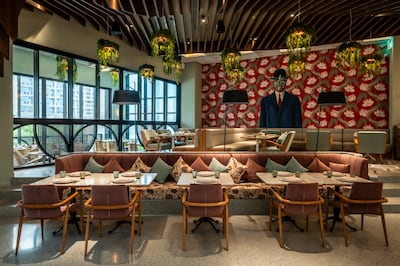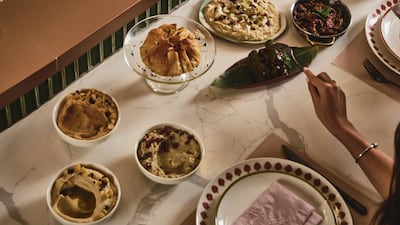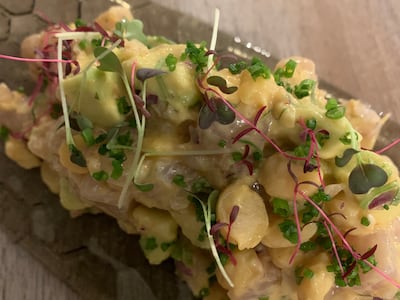Do you ask a chef or server for their recommendations when dining at a new restaurant?
In the current foodscape of set menus or omakase – where chefs decide what you're served – it is common practice among discerning diners to ask for suggestions when faced with the a la carte menu at an unfamiliar restaurant.
To that end, The National’s Taste Test series takes you inside the latest restaurants just before they open their doors. Chefs reveal what dishes they recommend – and what makes them special – for you to try (or, indeed, avoid).
This guide can help foodies wanting to tick off the latest restaurants from their culinary bucket list, which can be a Herculean task in the UAE where no fewer than a dozen restaurants are unveiled month on month.
Bon appetite.
Inside Alya, Abu Dhabi

Before taking you inside, it feels right to set some ground rules at Alya, which opens today at Beach Rotana Residences in Al Zahiyah.
This is Lebanese dining, but not as you know it. That means it’s familiar, though anything but traditional.
Chefs at the venue beneath Beach Rotana Residences focus on using the UAE’s multicultural dining scene as a springboard to try new things.
“Here, appetites are used to trying traditional-style dishes with a modern spin,” consultant chef Charbel Safi, who helped shape Alya’s menu, tells The National. “You will struggle to serve dishes like this in Lebanon, even though they’re dishes that are found across the country, only elevated.
“Diners in Abu Dhabi and Dubai are used to eating cuisines that have been dragged into the 21st century.”
And the same applies to the decor. It’s a riot of fuchsia and lace chandeliers, the furniture is chic, there are statement wallpapers of enormous plants, a man with an artichoke for a face and bright pink flamingoes. The kitchen has teal tiles. It’s distinctly “grandma's kitsch living room” instead of the plastic table and chair set-ups found throughout the shawarma restaurants that line Hamra Street in Lebanon's capital.
Outside, there is a vast terrace adjacent to the waters overlooking Al Reem. There are olive trees, overhead fans and pendant lighting. It’s cosy and pin-drop quiet despite its location in the heart of downtown Abu Dhabi.
As we bed in, Safi’s recommendations flow out of the kitchen.
A trio of hummus
If you can't choose one, choose three as Safi recommends: Classic, artichoke and meat.

“We braise the beef brisket for seven hours, letting the marbling of the fat run out and leaving the meat incredibly tender,” he says. “We add some pepper and pine nuts, too, for a little more flavour and texture.”
For the artichoke, an ingredient that can be seen here plentifully on both the menu and restaurant decor, chefs celebrate it in a new way. The hummus is marinated with artichoke and is served with some florets, too, finished with Parmesan cheese.
For the classic, they keep it simple. It’s just a little bit of extra virgin oil and chickpeas. No need to break tradition here.
Taste test: Where else to start in Middle Eastern cuisine than with hummus mopped up with freshly baked pitta? The pulled brisket version can be dunked, slathered and spooned over chunks of bread and the pillow-soft beef has little corners of charring. They hang around for about seven seconds before my dining partner and I inhale them. It’s a knockout – I’d come back daily for another bowl.
The artichoke version is inventive and the classic is so smooth it feels like it’s been passed through a sieve.
Lebanese ceviche

“It’s the sort of dish that would raise eyebrows with diners in Lebanon, even though all the ingredients can be found easily,” Safi says.
“White fish is in good supply off the Mediterranean coast, chickpeas are a staple, Lebanon’s lemons are excellent and we add avocado to it.”
Taste test: This is a classic UAE restaurant dish, found throughout kitchens of this stature where chefs aren’t afraid of taking their cooking heritage and fusing it with another cuisine. In this case, it’s Mediterranean meets Peruvian, which is a delightful combination. Chefs use king fish here and the Lebanese lemons give the hit of acidity it needs to gently cure. There are also avocado cubes in a nod to South America. However, the shelled chickpeas and a sauce of hummus and garlic bring the dish firmly back to the region.
Baklava melt
“Here, we take a traditional baklava dessert and make a savoury version,” the chef says.
“We use cow mozzarella and put a little spin on it with mint and chives. It’s wrapped in filo pasty, put in the oven to go crispy as the cheese melts and served tableside.”
Taste test: It’s another dish with fusion-style cooking at its heart, though this time it’s much closer to home. The baklava melt oozes, literally, flavours of a Greek kasseropita – a pie made with kasseri sheep’s cheese. While the mozzarella inside this version is gooey and stretchy, the delicate filo on top has darkened into a crunchy, buttery lid. One slice simply isn’t enough, and thankfully we’re given a whole pie to purr over.
Kebab halloumi
Proving that sometimes if it ain’t broke, don't fix it, this is authenticity on a plate.
“Not everything needs modernising, this is Lebanese cooking that everyone will know, I love it,” our cheery waiter adds. “It is my favourite.”
Taste test: This is a classic kebab platter and needs no “cheffy” showboating. Here, they combine skewers with cubes of both halloumi and lamb before roasting over fire.
The cheese retains its shape and squeaky texture, though charring on the edge adds a punch of flavour. The meat is soft, supremely seasoned and sits on a bed of saffron rice. Stitching it all together – and true to form for Alya – is something not often found on a kebab platter: A caramelised molasses sauce with an apple rind in the centre. It’s served on a pot on the side, for the traditionalists not yet ready for the future.
Mhalabiyeh cigar
“We wanted to refine a traditional Lebanese dessert,” Safi says.
“You know, when I go to London, we focus a lot on vegan recipes because that’s what diners want, that’s the market. When I’m in Lebanon, again I must adapt to palates there. And when I’m in the UAE, I can embrace the dining scene’s taste for invention and fusion.”
Taste test: It’s a fitting way to end a round-the-world trip with a Lebanese core. The mhalabiyeh, a personal favourite of mine when it comes to Middle Eastern desserts, is piped into the tuile and dipped in pistachio crumbs on each end. It resembles a cannoli (my number-one patisserie from Italy) and has the right amount of crispiness, courtesy of the orange syrup-soaked pastry that has been rolled into a cigar shape.
The added luxury of chocolate by premium French brand Valhrona exemplifies Alya’s ethos of elevating tradition. And in the capital, it’s sure to find an audience hungry to embrace it.
Alya is open daily from noon-11pm; 02 555 0018


